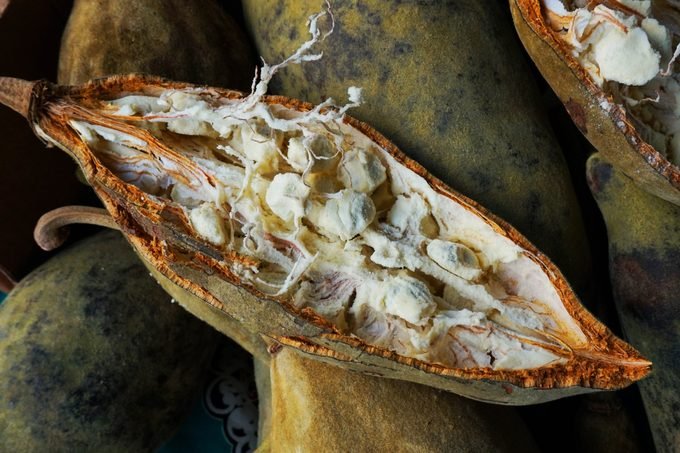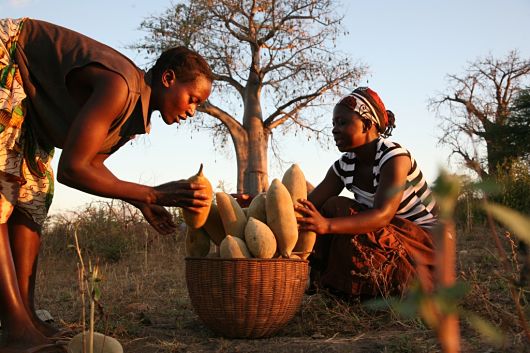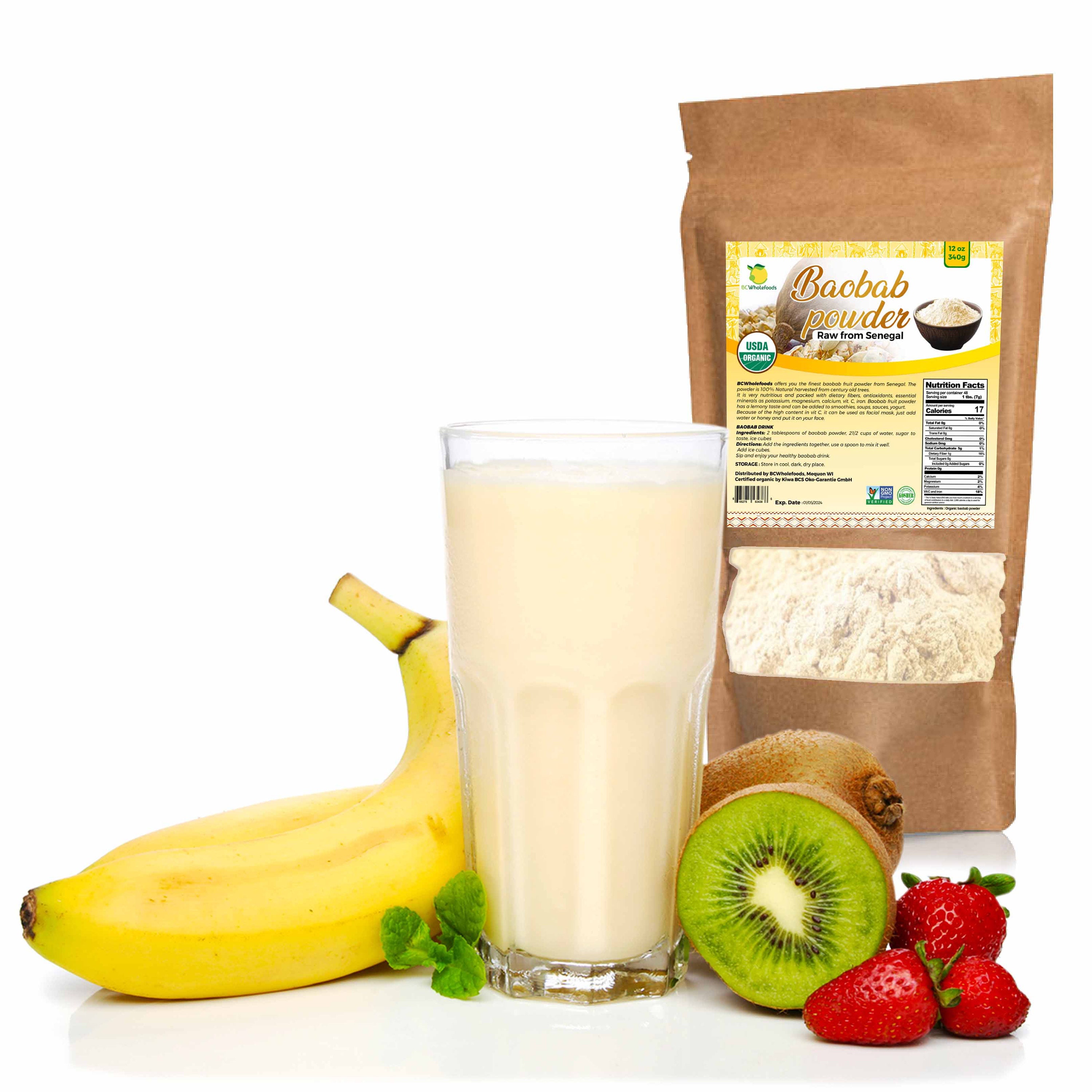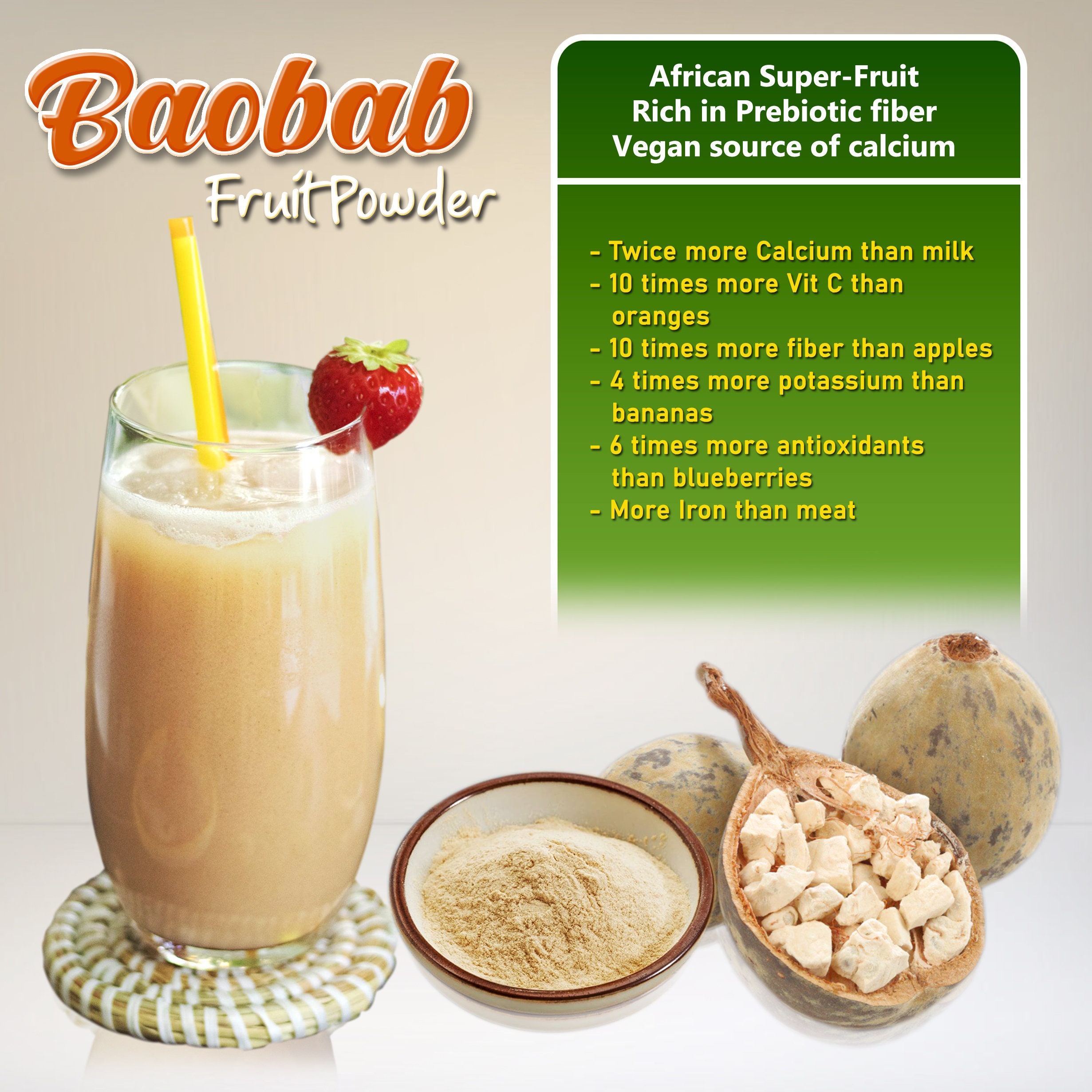Improve Male Fertility and Support Skin Health with Baobab Fruit Powder's Vitamin C and Zinc



The African baobab (Adansonia digitata L.) is one of the eight species of baobab (Adansonia) and the only one native to mainland Africa. Like other baobabs, the African baobab is a massive deciduous fruit tree, up to 20-30 m high, with a lifespan of several hundred years. Its swollen and often hollow trunk looks like a huge bottle and can be as broad as 3-7 m in diameter. It bears short, stout and tortuous branches and has a thin canopy. Baobab is strongly anchored in the soil by an extensive and strong root system that grows 2 m deep, and whose diameter may be higher than the tree height. The leaves are simple or digitally compound, dark-green on top, and borne at the end of a 16 cm-long petiole. The leaflets are between 5-15 cm long and 1.5-7 cm broad. The baobab shed its leaves during the early dry season and new leaves appear after flowering. The pentamerous flowers are white, large (20 cm in diameter and 25 cm long), and hang from stalks on pedicels up to 90 cm long. The fruit is a voluminous (35 cm long and 17 cm in diameter) ovoid capsule with a hard, woody envelope containing a pulp and black seeds. Once ripe, the fruit envelope becomes brittle and the pulp takes on a chalky consistency.

The baobab is mainly used for food. The fruits, flowers, leaves, shoots, roots of seedlings and even the tree roots are edible. The leaves can be used either fresh, as a cooked vegetable, or dried and powdered as a functional ingredient (thickener) of soups and sauces. The flowers, shoots and roots of seedlings are eaten. The fruits, called monkey-bread, contain a white, mealy, acidic tasting nutritious flesh that can be eaten as a sweet, used to make refreshing drinks and ice-creams, or used to adulterate and curdle milk. The seeds yield an edible and pleasant tasting oil, and oil extraction results in an oil meal. The bark is used for fiber or as firewood. The roots, that are boiled and eaten in times of famine, contain tannins that provide a useful red dye. Baobab trees provide fodder for animals: young leaves, fruits, seeds and the oil meal are consumed by livestock. Zones 10 to 12.

Top 6 Benefits of Baobab Fruit and Powder:
1. Rich in Many Important Vitamins and Minerals- Research shows that the nutritional content of baobab can vary depending on the geographical location where it’s grown and between different parts of the plant, such as the leaves, pulp and seeds.
For instance, the pulp is high in vitamin C, antioxidants and several key minerals like potassium, magnesium, iron and zinc (1Trusted Source).
The leaves are rich in calcium and high-quality proteins that can be easily digested.
Furthermore, the seeds and kernel of the plant are loaded with fiber, fat and micronutrients like thiamine, calcium and iron (2Trusted Source, 3).
However, in most parts of the world where fresh baobab is unavailable, it’s more commonly found as a dried powder.
Powdered baobab contains many important nutrients but is especially high in vitamin C, vitamin B6, niacin, iron and potassium.
Two tablespoons (20 grams) of powdered baobab provides approximately (4Trusted Source):
Calories: 50
Protein: 1 gram
Carbs: 16 grams
Fat: 0 grams
Fiber: 9 grams
Vitamin C: 58% of the Reference Daily Intake (RDI)
Vitamin B6: 24% of the RDI
Niacin: 20% of the RDI
Iron: 9% of the RDI
Potassium: 9% of the RDI
Magnesium: 8% of the RDI
Calcium: 7% of the RDI
Therefore, both powdered baobab and fresh parts of the plant are highly nutritious.
SUMMARY
Baobab is highly nutritious and different parts of the plant supply varying amounts of protein, vitamin C, antioxidants, potassium, magnesium, iron, zinc, calcium and B vitamins.
2. May Aid Weight Loss by Promoting Feelings of Fullness
- Some research has found that adding baobab to your diet may be beneficial if you’re looking to drop a few extra pounds.
It can help curb cravings and promote feelings of fullness, helping you eat less and lose weight.
One small study in 20 people showed that drinking a smoothie with 15 grams of baobab extract significantly reduced feelings of hunger compared to a placebo drink (5Trusted Source).
Baobab is also high in fiber, with most powdered preparations packing around 4.5 grams of fiber into each tablespoon (10 grams) (4Trusted Source).
Fiber moves through your body very gradually and can help slow the emptying of your stomach, keeping you feeling full longer (6Trusted Source).
Simply increasing your fiber intake by 14 grams per day has been shown to decrease calorie intake by up to 10% and reduce body weight by an average of 4.2 pounds (1.9 kg) over a four-month period (7Trusted Source).
SUMMARY
Baobab is high in fiber and has been shown to reduce feelings of hunger which could promote weight loss.
3. May Help Balance Blood Sugar Levels
Adding baobab to your diet may benefit blood sugar control.
In fact, one study found that baking baobab extract into white bread reduced the amount of rapidly-digested starch and slowed down the increase of blood sugar levels in the body (8Trusted Source).
Similarly, another small study in 13 people showed that adding baobab to white bread decreased the amount of insulin needed to transport sugar from the blood to the tissues to help control blood sugar levels (9Trusted Source).
Because of its high fiber content, baobab may also help slow the absorption of sugar into the bloodstream, which can prevent spikes and crashes in blood sugar and stabilize levels long term (10Trusted Source).
SUMMARY
Baobab may help slow the increase of blood sugar levels and decrease the amount of insulin needed to keep your blood sugar under control.
4. Antioxidant and Polyphenol Content May Reduce Inflammation
Baobab is packed with antioxidants and polyphenols, which are compounds that protect your cells from oxidative damage and reduce inflammation in your body.
Some studies suggest that chronic inflammation could contribute to a long list of health conditions, including heart disease, cancer, autoimmune disorders and diabetes (11Trusted Source).
Though current research is mostly limited to animals, some studies have observed that baobab may help decrease levels of inflammation in the body.
One rat study found that baobab fruit pulp reduced multiple markers of inflammation and helped protect the heart from damage (12Trusted Source).
A mouse study showed that baobab extract decreased oxidative damage to cells and reduced levels of inflammation (13Trusted Source).
However, despite these promising findings, more research is still needed to determine how baobab may impact inflammation in humans.
SUMMARY
Animal studies show that baobab may help reduce inflammation and prevent oxidative damage to cells, but more research in humans is needed.
5. High Fiber Content May Promote Digestive Health
Baobab is a good source of fiber, and powdered versions can contain up to 18% of the daily recommended value in just one tablespoon (10 grams) (4Trusted Source).
Fiber moves through your gastrointestinal tract undigested and is essential to digestive health (14Trusted Source).
For example, one review of five studies showed that eating more fiber increased stool frequency in people with constipation (15Trusted Source).
Fiber also acts as a prebiotic and feeds the beneficial bacteria in your gut, optimizing the health of your gut microbiome (16Trusted Source).
Other research shows that increasing your intake of fiber may also protect against conditions like intestinal ulcers, inflammatory bowel disease and hemorrhoids (17Trusted Source, 18Trusted Source, 19Trusted Source).
SUMMARY
Baobab is high in fiber, which may improve digestive health and prevent conditions like constipation, intestinal ulcers, inflammatory bowel disease and hemorrhoids.
6. A Great, Nutritious Addition to Your Diet — Fresh or Powdered
Baobab grows throughout Africa, Madagascar and Australia and can be eaten fresh or used to add a punch of flavor and nutrients to desserts, stews, soups and smoothies.
However, finding fresh baobab may be challenging in countries where the fruit is not commonly grown.
Fortunately, powdered versions are widely available at many health food stores and online retailers worldwide.
For a quick and convenient way to get your daily dose of baobab, try mixing the powder into your favorite beverages, such as water, juice, tea or smoothies.
You can also add the powder to baked goods or sprinkle a bit over yogurt or oatmeal for an antioxidant-rich treat.
With a little creativity, there are limitless ways to enjoy baobab and take advantage of the unique health benefits that it has to offer.
SUMMARY
Baobab can be consumed fresh or in powdered form and added to a variety of different recipes.
 (1)-550x550w.jpg)





Leave a Comment